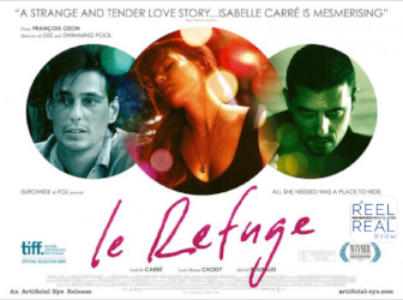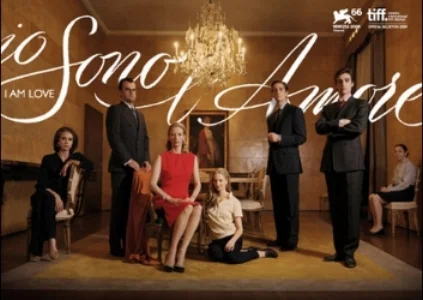Reel to Real: Le Refuge | Io Sono L'Amore
Francois Ozon used to be the enfant terrible of French cinema, and is still considered to be so in some quarters. He works fast, and his films have explored a range of topics and genres, from mystery (La Piscine/ Swimming Pool) to melodrama (Le Temps qui Reste/Time to Leave) to musical (8 Femmes/8 Women). The one constant in almost all his films has been the centrality of women - Sur le Sable (Under the Sand) was a stunning examination of a woman's grief at the loss of her partner, with a tour de force performance by Charlotte Rampling, and 5 x 2 was an alleged exploration of a marriage, but really, concentrated on the wife, played with luminous intensity by Valeria Bruni-Tedeschi. In Le Refuge, Mr Ozon trains his eye on the open, expressive face of Isabelle Carre, who delivers a naturalistic performance of quiet power.
Le Refuge begins with a pair of drug addicts shooting up - the beautiful couple are Mousse (Ms. Carre) and Louis (Melvil Poupad, Mr Ozon's muse in Le Temps qui Reste), who live in luxurious squalor in a chic Paris apartment while their incredibly young dealer (Emile Berling in a cameo appearance) supplies them with drugs. Within minutes of the film's running time, Louis has died from an overdose, and Mousse is told by his formidable mother that she should abort the child she wasn't aware she was carrying, while Louis' enigmatic younger brother, Paul (the singer Louis-Ronan Choisy, making an auspicious film debut) watches warily on the sidelines. Headstrong, difficult and independent, Mousse instead decamps to a countryside cottage belonging to an old friend where she uses medicinal methadone to cope while carrying all that she has left of Louis within her. Unexpectedly, Paul visits, and what begins as a cautious exploratory meeting between two uniquely damaged people turns into something akin to a love affair. Paul's complex family history and his complicated feelings toward his brother have driven him to Mousse, who knew and loved him best; Mousse, on her part, finds Paul intriguing as he represents a part of her lover that she was never allowed to know. Even though Paul is gay, this doesn't prevent the pair from falling in love, and soon, their refuge becomes a home. But Mr Ozon doesn't take the easiest way out, and the emotional complexities of this relationship - in particular, Mousse's feelings and thoughts as telegraphed beautifully in Ms Carre's subtle and moving performance - are played out in fascinating and deeply affecting detail.
Even though nothing much really happens in the film, Mr Ozon takes the opportunity to present a view of womanhood, and relationships, that is surprising and profound. A small gem, and an ideal double bill with Io Sono l'Amore.
Written and directed by Luca Guadagnino (lately of Call Me By Your Name and the remake of Suspiria) and starring Tilda Swinton, this gorgeous, sumptuously mounted Italo-melodrama is that rare ‘Art House’ film that lives and breathes with an immediate urgency that inspires rapture. From the very beginning, Mr Guadagnino establishes a careful but flawless rhythm that carries his filmmaking from one scene to the next - it is this rhythm that helps elevate the melodramatic elements of the storyline to a higher level.
Io sono l'amore (literally, I am Love) tells the story of Emma, a Russian woman who married a the scion of an Italian textile producing family and slowly lost every part of her identity through the years as she devoted her life to her husband, her children and her new country. However, with the children grown and facing some rather serious issues of their own, something stirs within Emma, and when an unlikely opportunity presents itself for her to experience life anew, she seizes it and runs, resulting in some unforeseen and devastating consequences for her and her family.
Obviously, a film like this cannot exist without an electrifying central performance, and Ms Swinton is more than up for the challenge. A formidable actor, there is a robust confidence that underlines her work as the resurging Emma that is exciting to watch. Mr Guadagnino has surrounded her with a gallery of character actors who each play their parts to the hilt (including Marisa Berenson, the legendary supermodel, returning to her Italian roots as the velvet-gloved, iron-willed matriarch of the family), and the film is not only beautifully made, it is also simply beautiful to look at. To quote a review I read: See this film by any means necessary.


